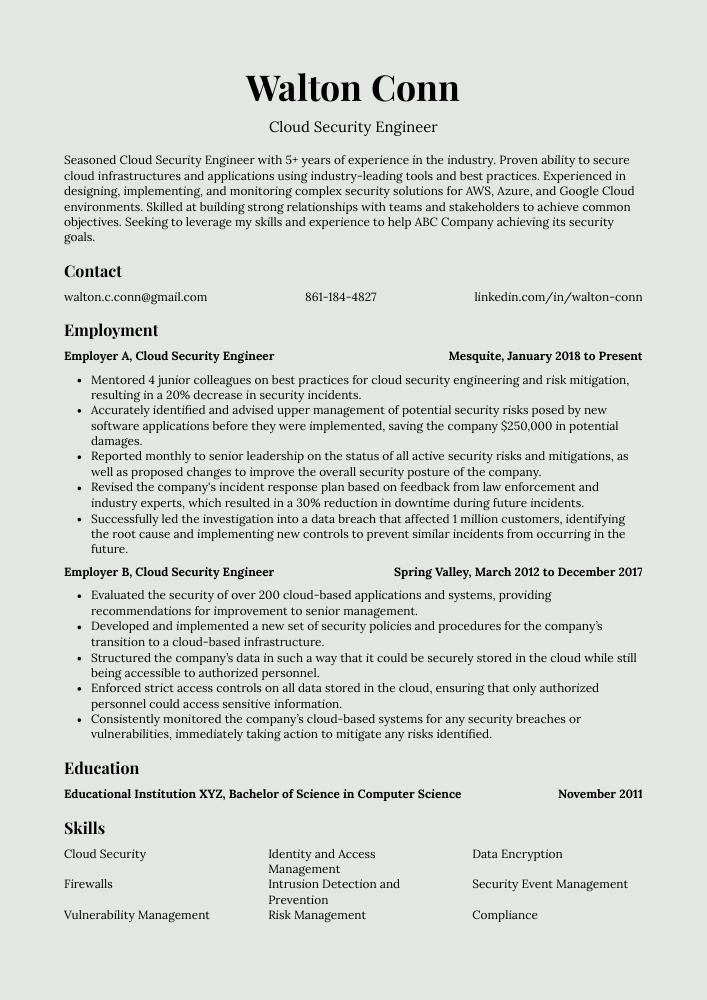Cloud Security Engineer Resume Guide
Cloud security engineers work to protect data and systems that are stored in the cloud. They do this by configuring and maintaining security measures, as well as monitoring for threats. In order to be successful in this role, one must have a strong understanding of both security principles and cloud technologies.
As a cloud security engineer, you possess the rare combination of technical know-how and people skills. You’re perfect for the role of securing sensitive data in the cloud. But to get recruiters’ attention, you first need an eye-catching resume.
This guide will walk you through the entire process of creating a top-notch resume. We first show you a complete example and then break down what each resume section should look like.
Table of Contents
The guide is divided into sections for your convenience. You can read it from beginning to end or use the table of contents below to jump to a specific part.
Cloud Security Engineer Resume Sample
Bertha Sipes
Cloud Security Engineer
[email protected]
266-701-6428
linkedin.com/in/bertha-sipes
Summary
Seasoned Cloud Security Engineer with 5+ years of experience in the industry. Proven ability to secure cloud infrastructures and applications using industry-leading tools and best practices. Experienced in designing, implementing, and monitoring complex security solutions for AWS, Azure, and Google Cloud environments. Skilled at building strong relationships with teams and stakeholders to achieve common objectives. Seeking to leverage my skills and experience to help ABC Company achieve its security goals.
Experience
Cloud Security Engineer, Employer A
Rochester, Jan 2018 – Present
- Mentored 4 junior colleagues on best practices for cloud security engineering and risk mitigation, resulting in a 20% decrease in security incidents.
- Accurately identified and advised upper management of potential security risks posed by new software applications before they were implemented, saving the company $250,000 in potential damages.
- Reported monthly to senior leadership on the status of all active security risks and mitigations, as well as proposed changes to improve the overall security posture of the company.
- Revised the company’s incident response plan based on feedback from law enforcement and industry experts, which resulted in a 30% reduction in downtime during future incidents.
- Successfully led the investigation into a data breach that affected 1 million customers, identifying the root cause and implementing new controls to prevent similar incidents from occurring in the future.
Cloud Security Engineer, Employer B
Buffalo, Mar 2012 – Dec 2017
- Evaluated the security of over 200 cloud-based applications and systems, providing recommendations for improvement to senior management.
- Developed and implemented a new set of security policies and procedures for the company’s transition to a cloud-based infrastructure.
- Structured the company’s data in such a way that it could be securely stored in the cloud while still being accessible to authorized personnel.
- Enforced strict access controls on all data stored in the cloud, ensuring that only authorized personnel could access sensitive information.
- Consistently monitored the company’s cloud-based systems for any security breaches or vulnerabilities, immediately taking action to mitigate any risks identified.
Skills
- Cloud Security
- Identity and Access Management
- Data Encryption
- Firewalls
- Intrusion Detection and Prevention
- Security Event Management
- Vulnerability Management
- Risk Management
- Compliance
Education
Bachelor of Science in Computer Science
Educational Institution XYZ
Nov 2011
Certifications
Certified Cloud Security Professional
Cloud Security Alliance
May 2017
1. Summary / Objective
Your resume summary is like a teaser for the rest of your resume. It should provide the employer with an overview of who you are and what you have to offer as a cloud security engineer. Some things you may want to mention in your summary include your experience designing and implementing security solutions in the cloud, your certification in AWS Security, and how you helped reduce costs by 30% at your previous company.
Below are some resume summary examples:
Driven cloud security engineer with 3+ years of experience securing cloud environments for small to enterprise businesses. Deep knowledge of AWS and Azure security best practices. Proven ability to harden cloud deployments and prevent data breaches. At XYZ, led the effort to secure sensitive customer data in our S3 buckets using server-side encryption and bucket policies. As a result, prevented 4 attempted data leaks by insiders and eliminated $12M in potential liability exposure.
Determined cloud security engineer with 8+ years of experience in the design, development, and implementation of information security solutions. Seeking to join ABC Tech as a cloud security engineer to protect company data and intellectual property from external threats. In previous roles, have led the successful transition of on-premises infrastructure to the cloud for 2 companies and implemented industry-leading security solutions that thwarted 3 major DDoS attacks.
Well-rounded cloud security engineer with experience in designing, implementing, and administering security solutions for cloud-based applications and systems. 7+ years of experience hardening the security posture of AWS and Azure deployments. In previous roles, helped reduce the mean time to detect (MTTD) and mean time to respond (MTTR) by 33% each. Also devised a new access control model that was successfully implemented across 10 production environments.
Committed cloud security engineer with 5+ years of experience working in DevOps and cloud environments. Expertise in AWS, Azure, and Google Cloud Platforms. Seeking to secure client data at ABC. At XYZ, led the charge in securing over 500 client applications and systems with an industry-leading 99. 999% uptime SLA. Achieved this by implementing comprehensive security policies and procedures across the company’s entire public cloud infrastructure.
Accomplished cloud security engineer with 5+ years of experience securing AWS and Azure environments. Skilled in designing, implementing, and maintaining comprehensive cloud security solutions that meet or exceed compliance requirements. Proven ability to reduce organizational risk exposure by identifying and remediating potential threats. Implemented industry-leading security controls that prevented data breaches for 2 major clients.
Hard-working and experienced cloud security engineer with 8+ years of experience in the field. Seeking to join ABC as a cloud security engineer to help protect the company’s data and systems from cyberattacks. In previous roles, helped design and implement security solutions that prevented data breaches for more than 200 companies. Also created a cloud-based vulnerability management system that reduced false positives by 45%.
Enthusiastic and detail-oriented cloud security engineer with 5+ years of experience in the design, implementation, and management of security solutions for AWS environments. Proven ability to identify and mitigate threats through comprehensive risk assessments. Seeking to leverage strong technical skills and analytical abilities to help ABC maintain a secure cloud infrastructure and protect data assets.
Dependable and adaptable Cloud Security Engineer with 4+ years of experience in planning, implementing, and enforcing security controls to protect cloud-based systems and data. Seeking to leverage background in AWS environments to secure the ABC platform. At XYZ, increased security posture by 120% through the implementation of automation and orchestration best practices.
2. Experience / Employment
In the experience/employment/work history section, you will want to provide details on your previous roles. This section should be written in reverse chronological order, which means your most recent job is listed first.
When writing this section, it’s best to stick to bullet points. This allows the reader to quickly digest the information you are sharing about your experience. When writing each bullet point, make sure to include what you did and any quantifiable results achieved.
For example, instead of saying “Responsible for cloud security,” you could say, “Created and implemented comprehensive security measures for sensitive data stored in the cloud, resulting in no data breaches or loss of customer information.”
To write effective bullet points, begin with a strong verb or adverb. Industry specific verbs to use are:
- Monitored
- Investigated
- Analyzed
- Evaluated
- Implemented
- Enforced
- Documented
- Trained
- Coordinated
- Responded
- Resolved
- Assessed
- Remediated
- Reported
Other general verbs you can use are:
- Achieved
- Advised
- Compiled
- Demonstrated
- Developed
- Expedited
- Facilitated
- Formulated
- Improved
- Introduced
- Mentored
- Optimized
- Participated
- Prepared
- Presented
- Reduced
- Reorganized
- Represented
- Revised
- Spearheaded
- Streamlined
- Structured
- Utilized
Below are some example bullet points:
- Presented cloud security roadmap to the executive team, resulting in company-wide adoption of new cloud security protocols.
- Efficiently monitored and identified potential threats in the cloud environment, preventing data breaches on multiple occasions.
- Implemented new security measures which reduced the chance of data breaches by 45%.
- Prepared detailed reports on current security posture and recommended changes to senior management.
- Reorganized the cloud security team, reducing response time to potential threats by 30%.
- Coordinated with the network team to deploy firewall rules and traffic monitoring policies for the cloud environment.
- Reliably implemented security controls for customer data in compliance with industry regulations (HIPAA, PCI DSS, etc.).
- Analyzed system logs and identified potential security threats on a daily basis; took appropriate remediation measures to mitigate risks.
- Remediated vulnerabilities in the cloud infrastructure and prevented unauthorized access with intrusion detection/prevention systems (IDS/IPS).
- Represented the company at various security conferences and forums, sharing best practices with other industry professionals.
- Assessed cloud security risks and vulnerabilities for over 50 client organizations, providing detailed reports with recommended mitigation strategies.
- Responded to data breaches and security incidents within minutes, limiting damage and minimizing recovery time & costs.
- Expedited the rollout of new security features and updates by collaborating closely with development teams.
- Improved cloud security posture for clients by implementing industry-leading best practices and tools.
- Introduced new cloud security protocols that reduced data breaches by 85%.
- Substantially increased system uptime and availability by implementing new security measures.
- Documented all security procedures and created comprehensive training materials for new staff.
- Formulated an incident response plan that achieved a 90% success rate in mitigating threats.
- Achieved CISSP certification and successfully completed multiple penetration testing projects.
- Trained 20+ new employees on cloud security best practices and procedures.
- Facilitated the implementation of a new cloud security strategy that increased data protection by 35%.
- Implemented a secure access control system for the company’s cloud infrastructure that reduced unauthorized access by 50%.
- Diligently monitored the company’s cloud environment for security threats and vulnerabilities, and took immediate action to mitigate any risks identified.
- Demonstrated excellent problem-solving skills when resolving complex issues related to cloud security.
- Spearheaded the development and implementation of a new security protocol that increased data protection by 50%.
- Optimized cloud server performance by monitoring traffic and implementing security measures that prevented hacking attempts.
- Investigated incidents of data breaches, identified root causes and took corrective action to prevent future occurrences.
- Independently developed and tested software patches to fix vulnerabilities in the system before they could be exploited.
- Resolved customer complaints related to security issues in a timely and efficient manner, resulting in a satisfaction rating of 98%.
- Reduced the number of cloud security incidents by 35% through the implementation of new security protocols.
- Participated in monthly conference calls with the Cloud Security Alliance to stay up-to-date on best practices and industry trends.
- Actively monitored the AWS environment for suspicious activity and conducted investigations when necessary.
- Compiled weekly reports on cloud security metrics and presented them to upper management.
- Streamlined the process for onboarding new developers to the AWS platform, reducing onboarding time by 30%.
3. Skills
The skills section of a cloud security engineer resume should be tailored to each job that the candidate is applying for. This is because the requirements will differ from employer to employer – one might require expertise in Amazon Web Services, while another might prefer Google Cloud Platform.
It is essential to keep this in mind when drafting your resume because many employers now use applicant tracking systems (computer programs that scan resumes for specific keywords). If the right keywords are not included, your resume may never make it past the initial screening stage.
Once you have listed your skills in this section, you can further elaborate on them by discussing them in more detail elsewhere in your resume, such as the summary or experience section.
Below is a list of common skills & terms:
- Cloud Security
- Compliance
- Data Encryption
- Disaster Recovery
- Firewalls
- Identity and Access Management
- Intrusion Detection and Prevention
- Risk Management
- Security Event Management
- Vulnerability Management
4. Education
Including an education section on your resume will depend on how far along you are in your career. If you just graduated and have no work experience, your education should be mentioned below your resume objective. However, if you have significant work experience that is relevant to the cloud security engineer role you are applying for, then omitting the education section is perfectly fine.
If an education section is included, mention courses, subjects, and assignments related to the cloud security engineer job you are applying for. For example “Courses included Cloud Security Principles & Practices and Secure Software Development Lifecycle.”
Bachelor of Science in Computer Science
Educational Institution XYZ
Nov 2011
5. Certifications
Certifications show that you have taken the initiative to stay up-to-date with your industry and are knowledgeable in certain areas. They can also be used to demonstrate proficiency in specific tools or platforms.
If you have any cloud security-related certifications, including them in this section of your resume will show hiring managers that you are serious about your career and dedicated to keeping your skillset current.
Certified Cloud Security Professional
Cloud Security Alliance
May 2017
6. Contact Info
Your name should be the first thing a reader sees when viewing your resume, so ensure its positioning is prominent. Your phone number should be written in the most commonly used format in your country/city/state, and your email address should be professional.
You can also choose to include a link to your LinkedIn profile, personal website, or other online platforms relevant to your industry.
Finally, name your resume file appropriately to help hiring managers; for Bertha Sipes, this would be Bertha-Sipes-resume.pdf or Bertha-Sipes-resume.docx.
7. Cover Letter
Submitting a cover letter along with your resume can give you a competitive edge in the job market. A well-written cover letter will show off your communication skills and highlight why you’re the best candidate for the role.
Keep in mind that a cover letter is not always required, but when it is, make sure to put some time and effort into crafting an engaging and interesting one.
Below is an example cover letter:
Dear Danika,
I am writing to apply for the position of Cloud Security Engineer at XYZ Corporation. As a certified Information Systems Security Professional (CISSP) with experience in cloud security, I am confident that I can be an asset to your organization.
In my current role as Cloud Security Engineer at ABC Corporation, I am responsible for ensuring the security of our AWS environment. I have experience implementing and managing security controls such as firewalls, intrusion detection/prevention systems, and encryption. I also have experience conducting vulnerability assessments and penetration tests. In addition, I am familiar with compliance standards such as ISO 27001/27002 and PCI DSS.
I believe my skills and experience would make me a valuable member of your team. I am eager to put my knowledge and expertise to work in order to help you secure your cloud environment. If given the opportunity, I am confident that I will exceed your expectations.
Thank you for your time and consideration; please do not hesitate to contact me if you have any questions or need additional information about my qualifications.
Sincerely,
Bertha
Cloud Security Engineer Resume Templates
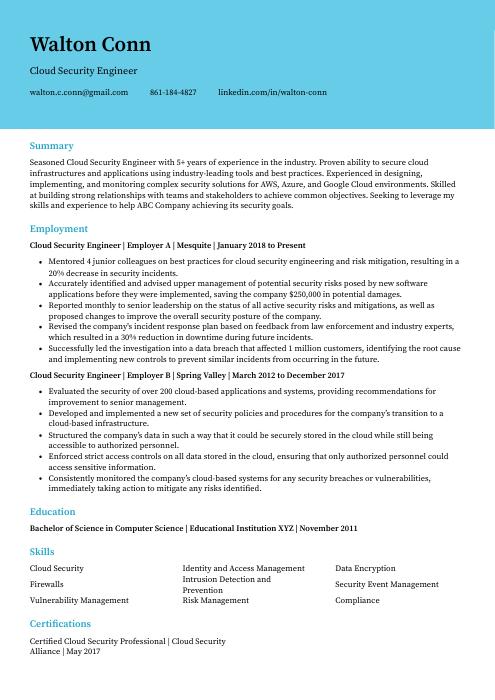 Dugong
Dugong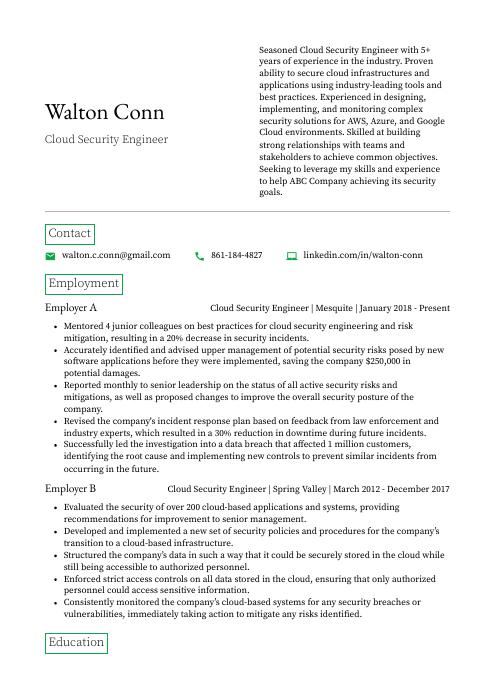 Quokka
Quokka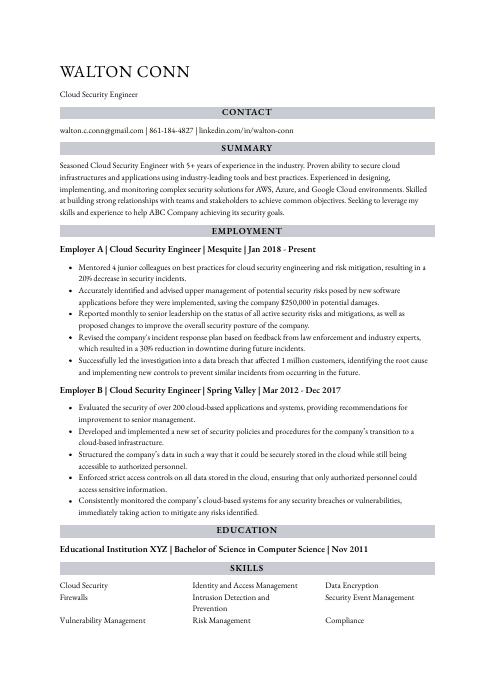 Numbat
Numbat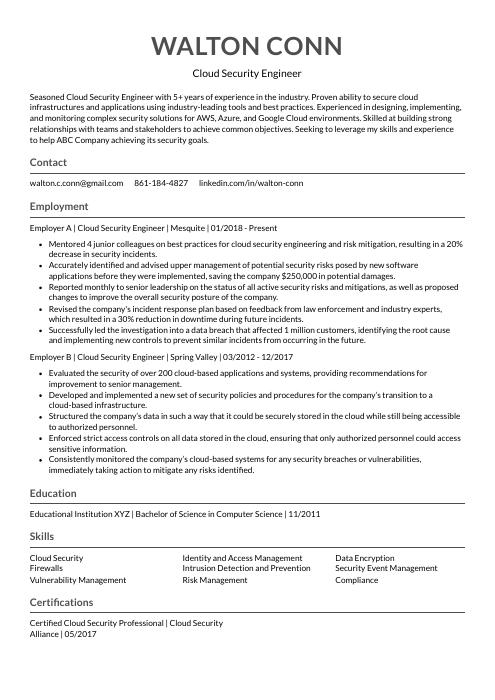 Indri
Indri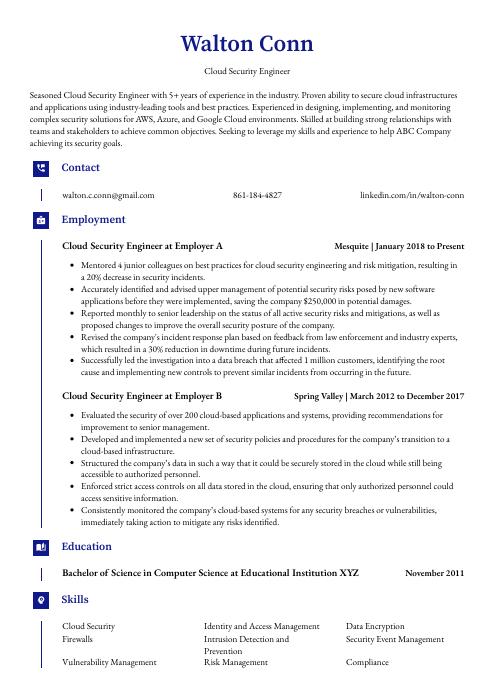 Gharial
Gharial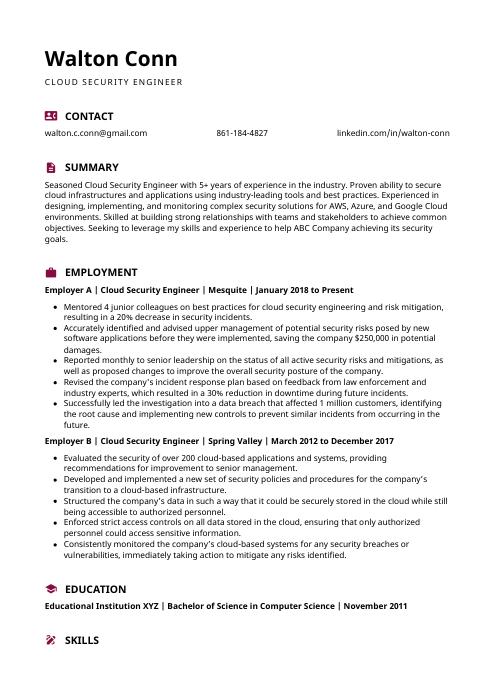 Hoopoe
Hoopoe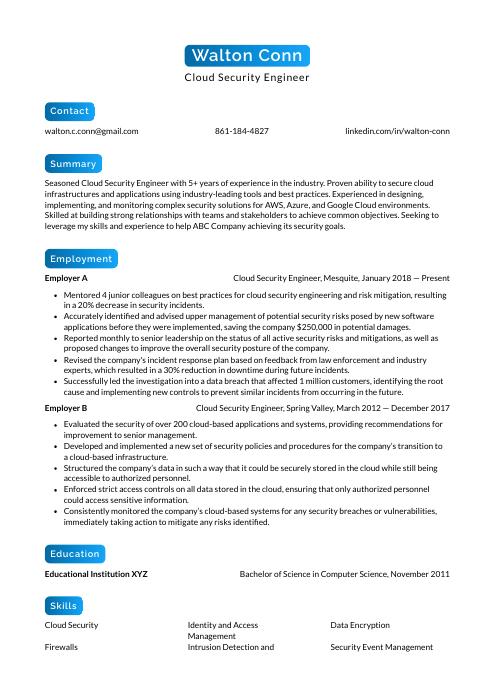 Kinkajou
Kinkajou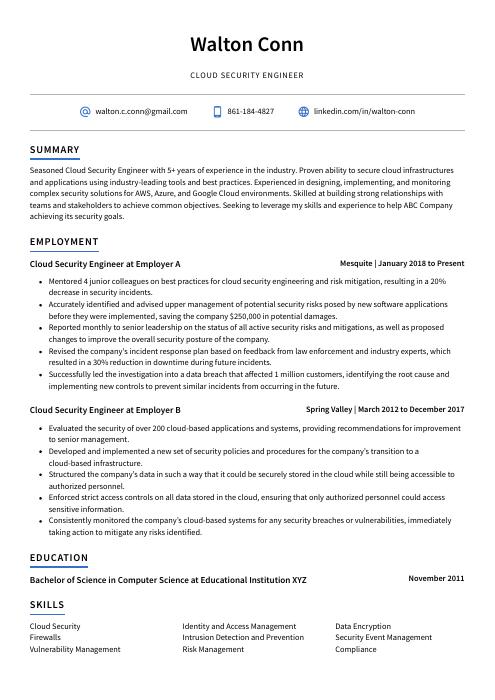 Axolotl
Axolotl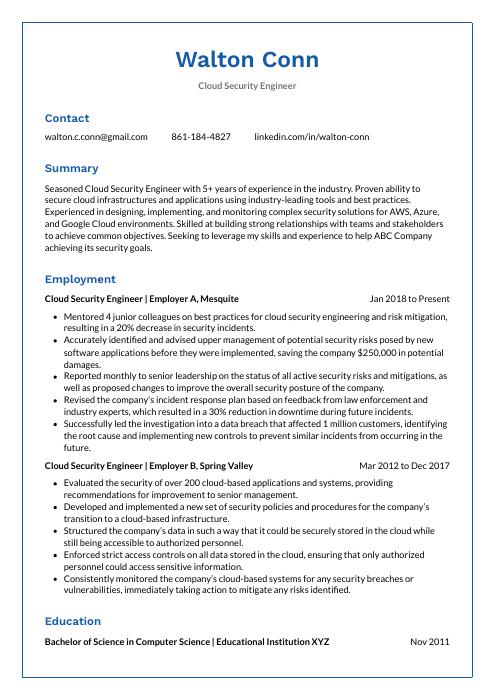 Markhor
Markhor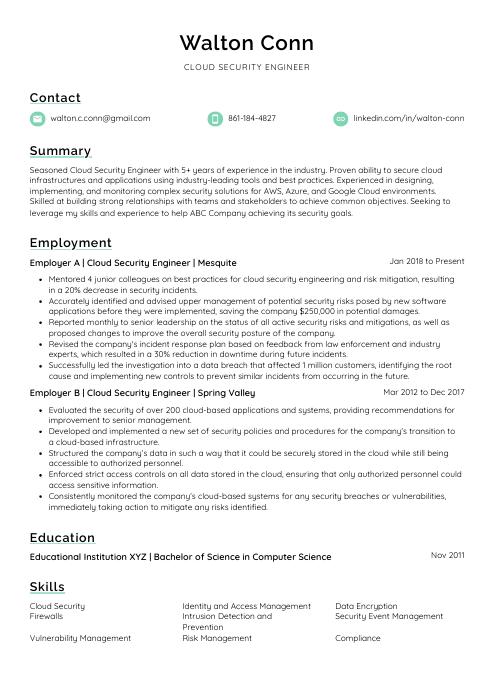 Lorikeet
Lorikeet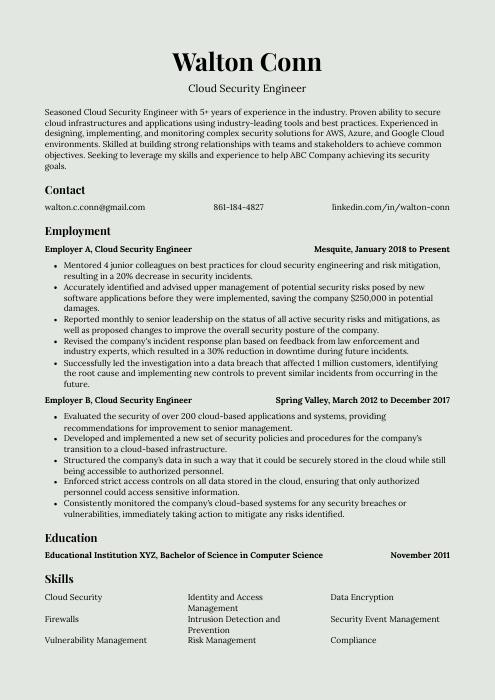 Saola
Saola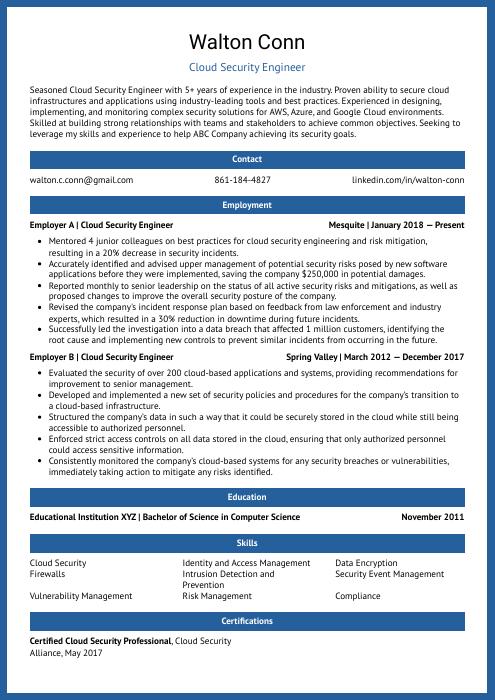 Ocelot
Ocelot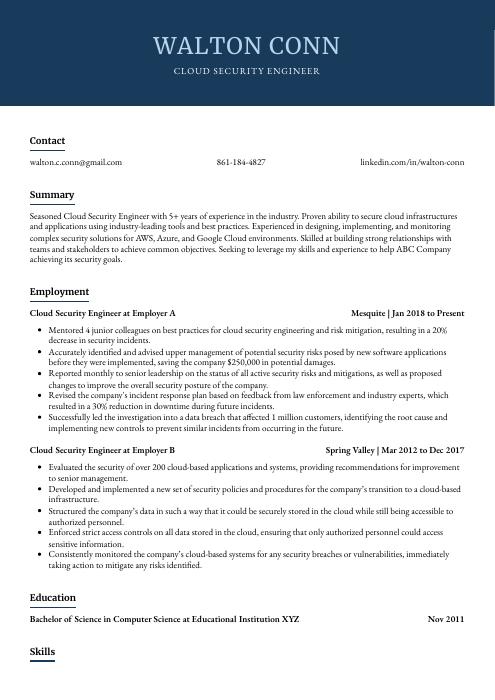 Bonobo
Bonobo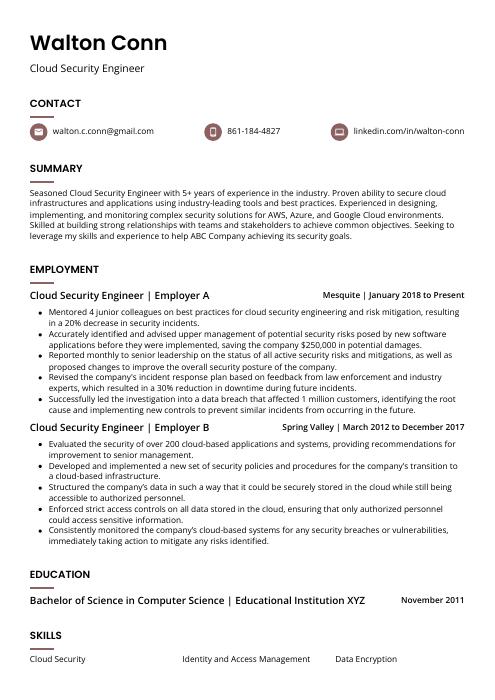 Fossa
Fossa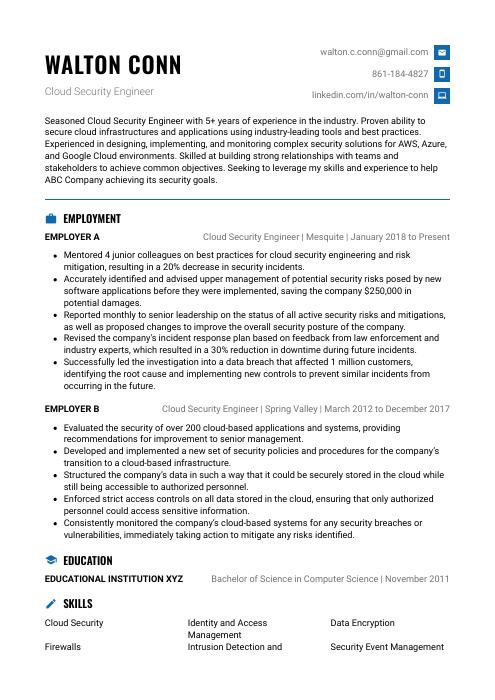 Echidna
Echidna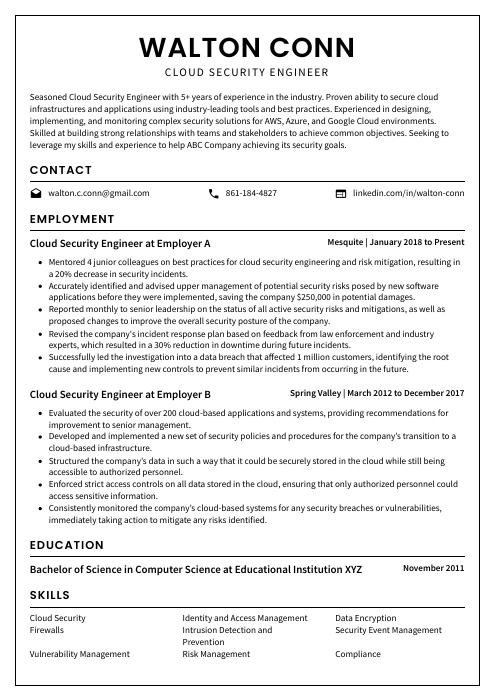 Cormorant
Cormorant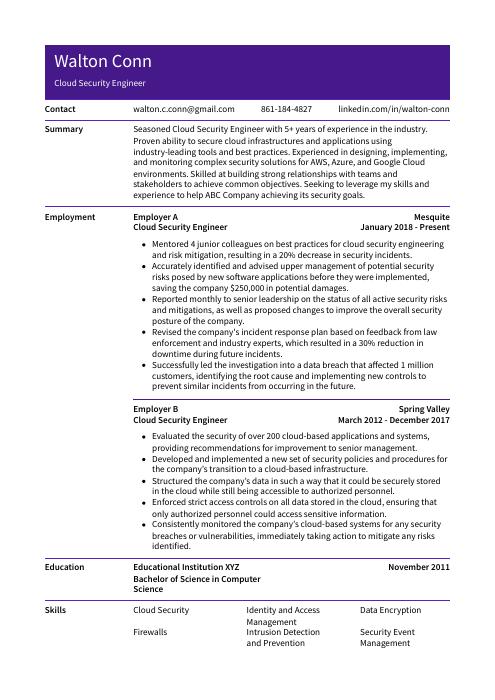 Pika
Pika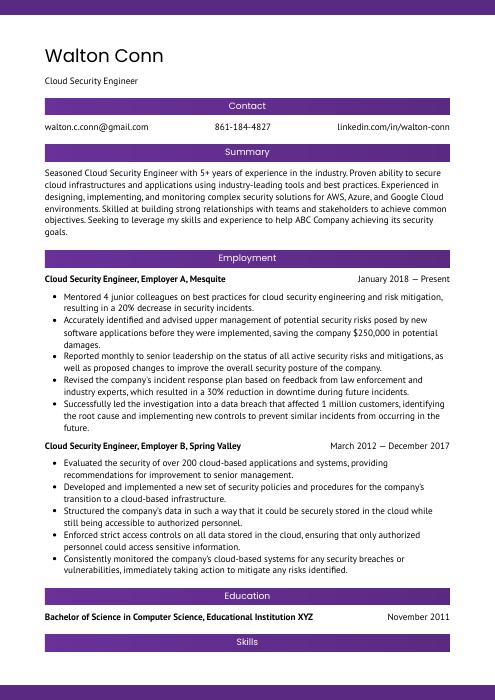 Jerboa
Jerboa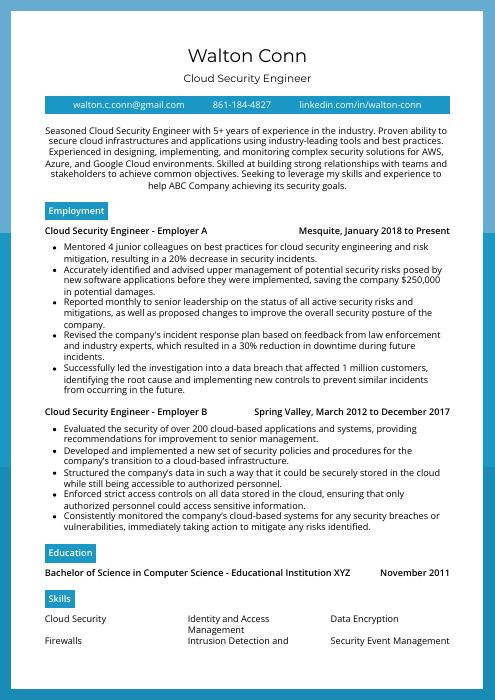 Rhea
Rhea Rezjumei
Rezjumei
